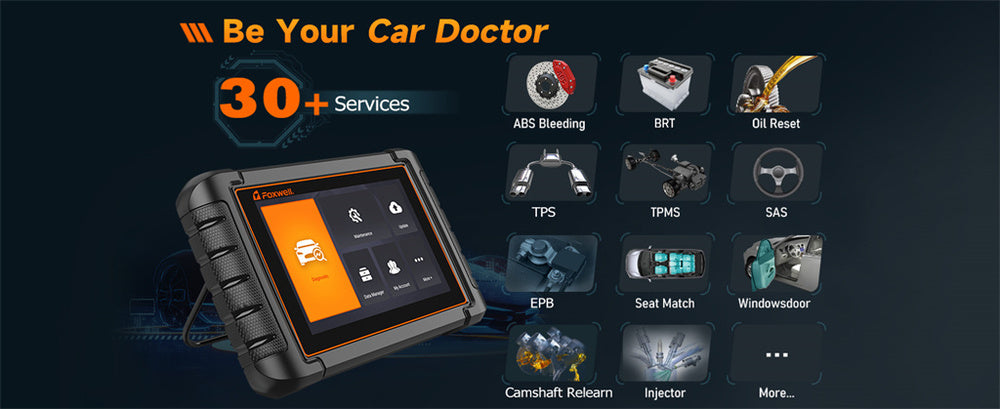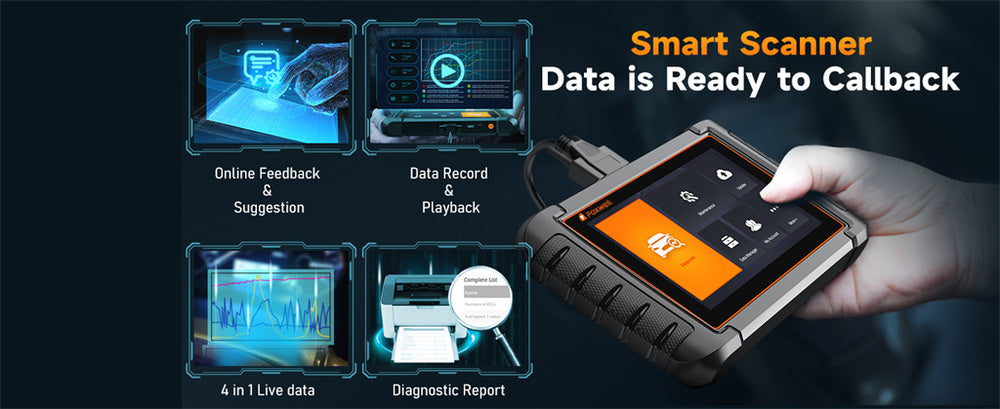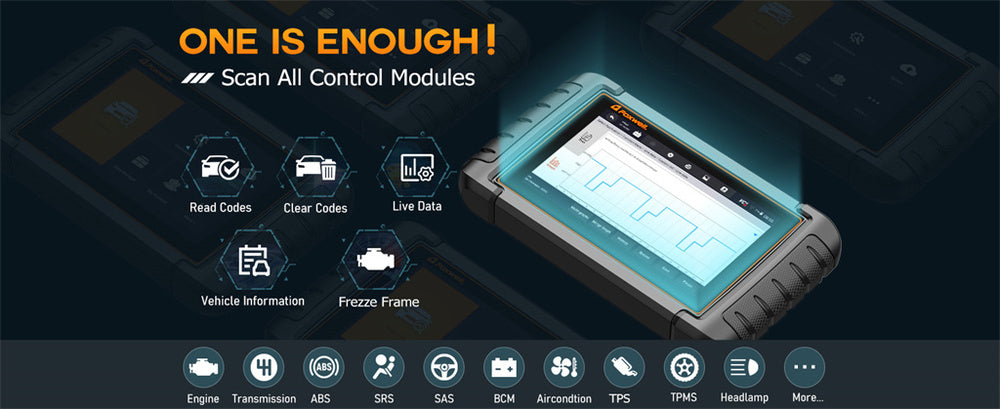OBD2 scanners have become an invaluable asset when diagnosing engine issues involving spark plugs, but how effective are they in identifying fouled spark plugs? Let's dive deeper into this topic.
What Are Spark Plugs and Common Issues?

Spark plugs are essential components in your vehicle's ignition system, sparking air-fuel mixture in its combustion chamber to generate power for your engine. However, over time, spark plugs may become fouled, resulting in several common issues:
Carbon Buildup:Carbon buildup occurs when fuel doesn't burn completely, leaving residue on the spark plugs and creating misfires and poor engine performance. Short trips where an engine doesn't reach optimal operating temperature may further exacerbate this problem, leading to misfires and poor performance of your engine.
Oil Fouling: Due to worn piston rings or leaky valve seals, oil may leak into the combustion chamber and produce oily deposits on spark plugs, leading to misfires, reduced fuel efficiency, and higher emissions. This issue must be properly addressed, as misfires may arise, reducing efficiency and emissions while misfiring is likely.
Fuel Mixture Issues: An excess of fuel compared to air can coat spark plugs with extra ethanol, leading to their fouling and fouling the engine management system or injectors. This problem often stems from issues related to injectors or engine management systems.
Cracked spark plugs may cause rough idling, poor acceleration, and difficulty starting the engine—all telltale signs that need to be recognized early to help prevent more serious engine problems later.
How Can an OBD2 Scanner Identify Spark Plug Problems?
OBD2 scanners are essential tools for diagnosing engine issues, particularly those related to spark plugs.
By connecting directly with your vehicle's onboard diagnostic system and providing access to data and diagnostic trouble codes (DTCs) generated by its engine control unit (ECU), OBD2 scanners allow users to gain critical insight into spark plug issues quickly.
Foxwell NT809 OBD2 scanner stands out among options, providing advanced diagnostic capabilities to detect spark plug problems more accurately:
Comprehensive Code Reading:The NT809 can read and clear DTCs across all systems. When it detects misfire (codes such as P0300-P0304), it helps determine which cylinder may be experiencing difficulty and pinpoint its exact location - potentially indicating a fouled spark plug.
Live Data Monitoring: This feature allows you to monitor real-time information from the engine sensors while driving for an optimal driving experience. You can observe parameters like engine RPM, fuel trim, and ignition timing, which could indicate whether spark plugs are firing correctly or not.
Graphing Capabilities:The Foxwell NT809 features graphing capabilities that make it easier to visualize engine performance changes over time and identify patterns that may suggest spark plug fouling.
Freeze Frame Data:Once a fault has been identified, the NT809 records freeze frame data of its engine operation at that moment - providing vital context to help diagnose spark plug issues more accurately.
Though the Foxwell NT809 offers powerful diagnostic tools, it is essential to remember that OBD2 data has its limits. Misfire codes might indicate issues with spark plugs. Still, they could also refer to other components requiring further inspection for a complete diagnosis.
Limitations of OBD2 Data: Can It Definitively Diagnose Failed Spark Plugs?
While OBD2 scanners can be invaluable tools, they do have their limitations when diagnosing spark plugs. Here's what to keep in mind when making this assessment:
Misleading Codes: OBD2 scanners read Diagnostic Trouble Codes (DTCs) generated by the Engine Control Unit (ECU), but sometimes, these codes can be misleading. For instance, a misfire code could mean anything from a foul spark plug to an ignition coil or fuel delivery problem.
Lack of Specificity: A spark plug that has become dirty but is not entirely worn down might not cause OBD2 data to register; as such, OBD2 information could overlook subtle problems that need further examination.
Need for Additional Diagnostics:Complementing OBD2 data with physical inspections or additional diagnostic tests may be necessary to gain a complete picture. For instance, inspecting spark plugs visually or running compression tests can reveal insights that a scanner cannot.
OBD2 scanners can help identify potential issues but should not be relied upon exclusively when diagnosing fouled spark plugs. A combination of OBD2 data and hands-on inspection is required for effective vehicle maintenance.
Alternative Methods for Spark Plug Diagnosis
Due to OBD2 scanner limitations, consider these alternative methods for diagnosing spark plug issues:
Visual Inspection:To perform a visual inspection, remove and scrutinize spark plugs for signs of carbon buildup, oil residue buildup, or excessive wear and tear. This hands-on test can give immediate insight into their condition.
Compression Testing: Carrying out a compression test is one way of testing whether an engine is functioning normally. Low compression can indicate problems like blown head gaskets, worn piston rings, or valve issues in individual cylinders.
Fuel Pressure Testing:Testing fuel pressure will allow you to detect delivery problems and ensure proper spark plug performance. Having the correct pressure levels can prevent misdiagnosis of related issues.
Ignition System Checks: Examine other components of the ignition system, such as coils and wires. An effective ignition system is essential to optimal spark plug performance.

Conclusion
OBD2 scanners like the Foxwell NT809 can be valuable tools for diagnosing car issues; however, when used to diagnose spark plug issues precisely, they should only be utilized as part of a comprehensive strategy to assess all aspects of spark plug health effectively. While they provide valuable data, they cannot replace physical inspection or other forms of diagnosis.
Combining OBD2 data with visual checks and additional tests allows for more accurate diagnosis. This comprehensive approach not only addresses immediate problems but also uncovers any underlying ones. Hence, your vehicle continues to run smoothly for years.
Effective vehicle maintenance relies on an understanding of your car's individual needs, so don't be intimidated to get dirty with vehicle care! With these insights at your fingertips, you should be better positioned to address spark plug issues effectively and safely!
FAQs
Will worn out spark plugs throw a code?
Yes, worn-out spark plugs can trigger an engine misfire, which is often detected by the ECU and will throw a code, such as P0300-P0304.
How to diagnose bad spark plugs?
You can diagnose bad spark plugs using an OBD2 scanner to check for misfire codes, visually inspecting the plugs for damage or fouling, and performing a compression test or ignition system check.
What are the symptoms of a fouled plug?
Symptoms of a fouled spark plug include poor acceleration, rough idling, engine misfires, difficulty starting, and decreased fuel efficiency.




Leave a comment
This site is protected by hCaptcha and the hCaptcha Privacy Policy and Terms of Service apply.